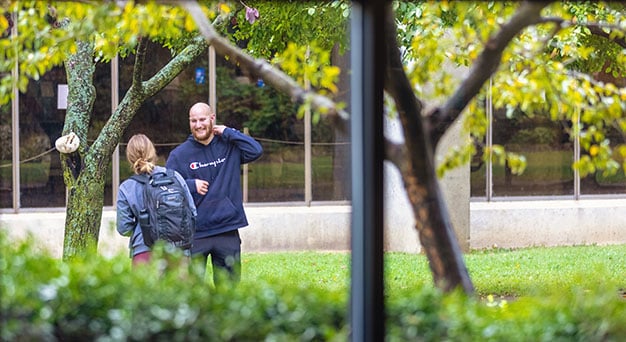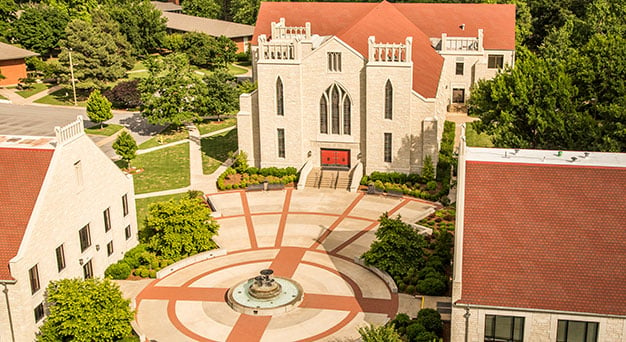- Give
- Alumni
- Parents
John Brown University
2000 W. University St., Siloam Springs, AR 72761479-524-9500
jbuinfo@jbu.edu
M.S. Counseling
A master's in counseling from a Christian perspective.
Emphases in marriage and family therapy, play therapy, and adventure therapy.
Loading...

Marriage & family therapy
Through the integration of classroom instruction and clinical preparation, students are exceptionally equipped for counseling careers and ministry positions as Licensed Marriage and Family Therapists (MFT).

Play therapy
An emphasis in play therapy teaches students to use a variety of play and creative arts techniques to better assist children to communicate or express their thoughts and feelings.

Adventure therapy
Students graduate ready to use experiential therapy to promote healing, encouraging clients to reflect upon experiences using goal-based activities that provide a window into their unique mental traits and challenges.
Accreditation
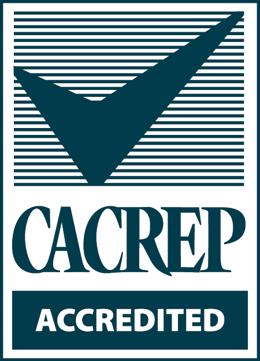
The Council for Accreditation of Counseling and Related Educational Programs (CACREP), a specialized accrediting body recognized by the Council for Higher Education Accreditation (CHEA), has granted accreditation to the M.S. in Counseling program at JBU through March 31, 2032.
Earn your M.S. in Counseling
Employment of mental health counselors is projected to grow 23% from 2020 to 2030, much faster than the average for all occupations. JBU's program prepares you to help meet that need.
Admissions Requirements
- An undergraduate GPA of 2.75 or higher (4.0=A).
- Individual interview with a Graduate Counseling faculty member.
- Full admissions requirements
M.S. Requirements
- 60 total credit hours:
- 42 credit hours of counseling core requirements
- 15 credit hours of clinical requirements
- 3 credit hours in an emphasis of your choice
- Example degree plan
What to expect in the M.S. Counseling program
The Master of Science degree program in Counseling provides academic, clinical, and dispositional training related to professional counseling. This program prepares students for professional counseling careers in a variety of diverse settings.
Experienced faculty
Our faculty are licensed counseling professionals with active clinical caseloads so they understand the demands and changing nature of being a counselor.
Multiple program locations
In-person classes can be taken in Northwest Arkansas or in Little Rock. Classes last 14-15 weeks and are held in the evenings or weekends to coordinate with your busy schedule.
Internship placement support
Unlike many other programs, JBU employs field placement directors to help students find their practicum and internship sites. We have long-standing relationships with clinics and agencies in Arkansas, Oklahoma and Missouri.
What sets JBU apart?
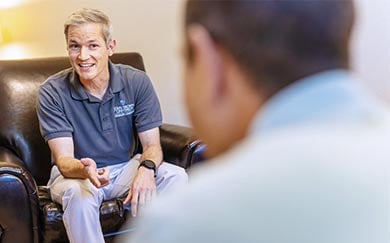
An integrative approach
JBU is the longest-standing counseling program in Arkansas and takes an integrative approach to counseling/psychology and faith/theology within a professional and ethical framework.

In-person training
Counseling is a deeply personal endeavor that requires in-person, face-to-face, emotionally-connected relating. The JBU counseling faculty mirror the counseling profession with in-person training for students to best evaluate and assist their interpersonal development and effectiveness across the entire degree program.
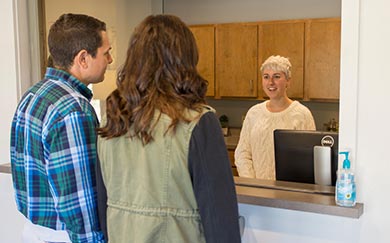
Community Counseling Clinic
JBU operates two Community Counseling Clinics (Siloam Springs & Little Rock) that provide low-cost or no-cost counseling to those in need. The clinics are training sites that allow counseling students to practice their clinical skills under the supervision of licensed faculty members.
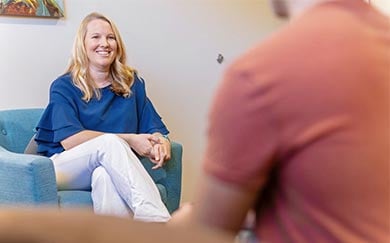
Placement rate
100% placement rate for students in their required practicum and internships utilizing 44 clinical sites across Arkansas, Missouri and Oklahoma.
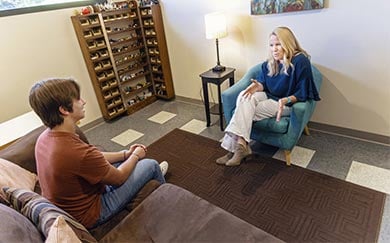
National exam pass rates
In 2023, ninety-seven JBU counseling graduates took the National Counseling Exam (NCE) as part of the licensure process in Arkansas and 87% of these graduates passed this exam.
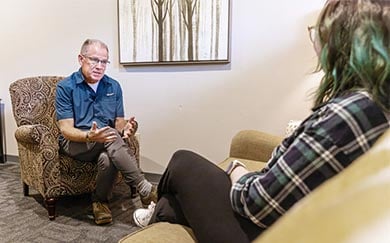
Graduates and job placement
In 2023 there were 61 graduates from the counseling program, 97% of whom landed employment or were enrolled in further graduate studies within six months of graduation..
Next steps
Choosing a graduate program is a big deal, and our staff and faculty are committed to making this process easy for you.
Admission
Our admissions team is here to navigate the application process, so you have all the information to be confident in your decision.
- Request information
- Apply online
- Get accepted
- Enroll in classes
Financial aid
You deserve a transparent, helpful financial aid experience. We'll work with you to ensure you're taking advantage of all of your financial aid opportunities.
Start classes
Most JBU graduate classes happen in 8-week blocks (counseling and education have some 16-week classes). Online and face-to-face class options provide flexibility for your busy schedule. See the courses offered here.
Why JBU?
See what our alumni have to say...
Hanna Burge '20
"I entered the program with the plans to change lives, but I ultimately ended up finding my own life within the mix. I am overall a healthier person in all areas of my life and feel confident and equipped to face challenges that come before me both as a mental health clinician and as an individual."

Betsy Dedrick '20
"I have made lifelong friendships and community connections that will serve me and my clients well in the future. The program helped me believe in myself and my ability to conquer tough goals. . . The professors are top notch and integrate faith as well as their professional experiences into the program. They walk the walk and talk the talk. Amazing, all-giving and family atmosphere offers support, understanding, and lifelong friendships!"

Kelsey White '19
“I feel like this program not only helps you grow academically, but it helps you grow personally. The teachers here are very intentional about getting to know you and want to help you understand what your counseling style is, and then helping you grow in that.”

Frequently asked questions
Is the M.S. in Counseling an online program?
While the counseling curriculum has a few online courses (roughly 20% of the curriculum), the field of counseling is best taught face-to-face where faculty can mirror counseling techniques for students. Classes are taught in the evenings and weekends at three campus locations — Siloam Springs, Rogers and Little Rock.
Can I work while enrolled in the M.S. in Counseling degree program?
Yes! Most counseling students work while matriculating through the program. However, during the practicum and internship phase of the program, students need to commit 20+ hours per week toward the completion of their clinical hours.
What is the typical counseling class size?
Most classes are capped at 24 students, but a number of clinical courses have lower caps due to the skill-based nature of the class.
What is a typical class like?
A typical counseling class meets for 2.5 hours on a weekday evening where roughly 12-20 students interact with the latest psychological research, evidence-based practices, diverse theological values/commitments, and cultural competencies under the direction/supervision of program faculty who are also licensed clinicians.
Courses meet for 14 or 15 weeks and are highly interactive and academically rigorous. Certain courses are focused specifically on counseling skill development in preparation for Practicum/Internship courses where students are providing actual counseling to real clients.
Does the M.S. in Counseling program have CACREP accreditation?
The counseling department is CACREP accredited.
Why is an interview required for admission?
The interview is to assess your readiness for the counseling program.
What is covered in the admissions interview?
Questions include topics such as:
- Future goals
- Why you are interested in counseling
- How your previous work has prepared you for a helping profession
- Previous academic studies
- Strengths and weaknesses as a helper
- Feedback on JBU’s faith-based mission
- Cultural differences and relationships
Do I have to be a Christian or know the Bible well to enroll in the program?
No, you do not.
Ranked #1
The Wall Street Journal: #1 college in Arkansas
U.S. News and World Reports: Top-ranked southern regional university since 2016
College Consensus: Best Online Colleges & Universities
Employers know when they see "John Brown University" on your resume, they'll be getting top talent.
Explore our graduate programsReal-world application
Whether you're a business student developing a strategic plan or a counseling student conducting live therapy, you'll have the opportunity to apply what you're learning through hands-on experiences.
Explore our graduate programsEngaged & experienced faculty
JBU's expert faculty will bring your coursework to life with extensive field experience and also teach you how to incorporate your faith into your work. They are invested in your success and will be a valuable resource during your time at JBU and beyond.
Resources
Policy Information
JBU does not unlawfully discriminate based on race, color, national or ethnic origin, sex, age, disability, marital status, military status, or age in the administration of its educational policies, admissions, financial aid, employment, educational programs, or activities.
John Brown University is a leading private Christian university, training students to honor God and serve others since 1919. Arkansas’ top-ranked university (The Wall Street Journal) and top-ranked regional university (U.S. News), JBU enrolls more than 2,200 students from 37 states and 42 countries in its traditional undergraduate, graduate, online and concurrent education programs. JBU offers more than 50 undergraduate majors, with top programs including nursing, psychology, construction management, graphic design, family and human services, and engineering. Eighteen graduate degrees are available in business, counseling, cybersecurity, and education.
Copyright 2024 John Brown University. All rights reserved.

